Future of County’s Platt Road Site Debated
Washtenaw County board of commissioners meeting (Feb. 5, 2014): Two items drew most of the debate during the county board’s recent meeting: Dealing with the future use of county-owned property on Platt Road, and hiring a contract worker to help with the budget process.
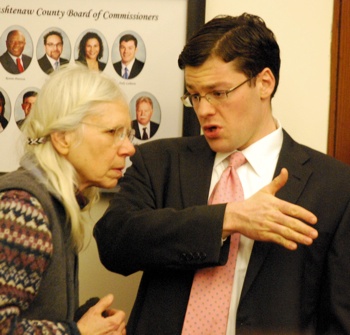
Jeannine Palms, who served on a citizens advisory committee to make recommendations for the county-owned property at 2260-2270 Platt Road, talks with commissioner Andy LaBarre (D-District 7), who helped lead that effort. Palms spoke during public commentary to praise the process and urge commissioners to adopt the recommendations. (Photos by the writer.)
A citizens advisory committee made recommendations for the 13.5-acre site at 2260-2270 Platt Road, and included the desire to use a portion of the land for affordable housing. Inclusion of affordable housing is a condition for accepting a $100,000 planning grant from the state, and that condition worried some commissioners. Rolland Sizemore Jr. (D-District 5) was particularly vocal in disagreeing with this approach. He suggested selling the land instead, then using the proceeds to pay for repairs and renovations of existing houses in the county, including those for sale through tax foreclosure auctions.
The board voted to give initial approval to the Platt Road recommendations, over dissent from Sizemore. A final vote is expected on Feb. 19. If approved, the county would then launch a much broader community planning process to determine the future use of that site.
Also debated at length was a proposal to hire a contract worker who would support budget-related work for the county board and administration. Commissioners had also discussed this issue during the board’s Jan. 22, 2014 meeting, when Ronnie Peterson (D-District 6) questioned the process for hiring this kind of staff support. On Feb. 5, several commissioners expressed concern about spending money on this position and wanted more details about funding and duties. Those concerns led to a unanimous vote to postpone the item until March 5.
A proposal to create a dental clinic for low-income residents received initial approval on Feb. 5, over dissent from Dan Smith (R-District 2). The $1.5 million project includes partnering with the nonprofit Michigan Community Dental Clinics Inc. to run the clinic and with St. Joseph Mercy Health System, which would contribute space at its Haab Building in Ypsilanti at little to no cost. A final vote is expected on Feb. 19.
In other action, the board gave final approval to two items with no significant discussion: (1) creation of a new countywide program to help finance energy-efficiency projects for commercial properties – the Property Assessed Clean Energy (PACE) program; and (2) a new ordinance that allows the county to issue municipal civil infractions for owning an unlicensed dog. The county treasurer’s office – which is responsible for administering the dog licenses – expects to implement the changes in June or July, following an educational outreach effort.
Commissioners also passed a resolution urging Gov. Rick Snyder to use the state’s budget surplus in part for road repair, and approved a resolution honoring local attorney Jean Ledwith King for her service on the county’s historic district commission.
Commissioner Yousef Rabhi (D-District 8) gave an update on efforts to address services to the homeless community. Advocates for the homeless had attended the board’s previous meeting, on Jan. 22, 2014. The board received a more detailed update on this situation at its Feb. 6 working session. That session will be covered in a separate Chronicle report.
Platt Road Property
Recommendations from a citizens advisory group for Platt Road property owned by Washtenaw County were on the Feb. 5 agenda for initial approval.
The 13.5-acre site at 2260 and 2270 Platt Road formerly housed the juvenile center. The advisory committee, which was created by the board on Sept. 18, 2013 and met three times late last year, recommended that the county use a $100,000 grant from the Michigan State Housing Development Authority (MSHDA) to fund a community design process for the property.
The committee recommended that the county keep the property until a design process is completed, according to a committee report. Specifically:
The CAC identified through consensus a number of principles that could apply to the site including demonstration for green technologies and sustainable design, mixed use, mixed income including affordable and moderately priced housing, minimized parking spaces, alternative transit, varied types and forms of housing for people of different ages, an urban village, less impervious surface, lower auto footprint, integration with neighborhood, visionary design, draws people to the site, opportunities to grow businesses, and connections to County Farm Park. In order to fit into its surroundings, the final composition of this site should serve to transition from the commercial aspects of Washtenaw Ave., the residential aspects of the local neighborhoods and the natural aspects of the County Park facility. Finally, it should incorporate uses that reflect its value as a county property and bring the opportunity of use or value for all Washtenaw County residents.
One of the resolved clauses stated that the county would commit to using a portion of the property for affordable housing. That’s a condition of accepting the $100,000 planning grant from MSHDA. The grant is part of a $3 million federal grant awarded to the county in 2011 and administered by the county’s office of community & economic development (OCED).
The resolved clause states:
BE IT FURTHER RESOLVED that the Board of Commissioners directs the CAC to assist in hosting an intensive multi-day community design process to create a plan for the site, inclusive of affordable housing;
The resolution also directs the advisory committee to provide more detailed analysis and recommendations by Sept. 31, 2014.
Committee members are: Ron Emaus, Jeannine Palms, Vickie Wellman, Rob Burroughs, Amy Freundl, Pete Vincent, Christopher Taylor (Ann Arbor city councilmember), and Jennifer Hall (Ann Arbor housing commission director). Also serving on the committee were Washtenaw County staff members Meghan Bonfiglio of the county parks & recreation commission; Greg Dill, director of infrastructure management; and Mary Jo Callan, director of the office of community & economic development. County commissioners on the committee are Yousef Rabhi and Andy LaBarre, who both represent districts in Ann Arbor.
Platt Road Property: Board Discussion
Andy LaBarre (D-District 7) thanked members of the advisory committee for their work. Yousef Rabhi (D-District 8) described the work as a citizen-driven process, and reminded commissioners that they had discussed the need for citizen input when they created this committee last year. People had brought their ideas and values to the table, he said, and the committee was able to reach consensus so they hadn’t even needed to take a vote on the final report.
Rabhi said he didn’t think approval of these recommendations by the board was a vote about what to do with the property. It’s just a step, he said, and there will be additional, broader community engagement before anything is decided.
Ronnie Peterson (D-District 6) said he appreciated the citizens involvement and valued their input. He cautioned that voting on the recommendations meant that the board would be adopting them, which would lead to more limited flexibility – specifically related to affordable housing. He’d be more comfortable simply accepting the recommendations. This is a different process than the county typically uses to dispose of its property, he noted.
Peterson didn’t think the county should be in the housing business, but the recommendations indicate that the county would be committed to providing affordable housing on that Platt Road site. He noted that the value of the property is estimated at $2 million or more, and that could be used for the good of all Washtenaw County residents.
Conan Smith (D-District 9) said it was important for the board to approve the recommendations. He indicated that unless he was misreading the resolution, he thought it meant that the board is just committing to a community-based process, rather than the usual way that the county deals with property. He noted that there wasn’t a community-based process when the county expanded the jail, for example. He thought it was a good commitment to make to the neighborhood, though any final decision about what to do would be made by the board.
LaBarre described the resolution as having four central elements: (1) that the county doesn’t sell all of the property, (2) that the property includes some aspect of affordable housing, (3) that development on the property should match its surrounding environment, including the commercial corridor of Washtenaw Avenue, the residential neighborhoods, and County Farm Park, and (4) that the site should include an asset that the whole county can benefit from and use.
Approving the recommendations would allow the county to leverage MSHDA dollars for a “super process” of community engagement, LaBarre said. The specific recommendations from that broader process would be acted on by the board. “We are not committing ourselves to a design process,” he said, in terms of specific actions.
Mary Jo Callan, director of the county’s office of community & economic development, came to the podium. She said the committee is asking that the county not sell the property outright, but instead go through a community engagement process that is deliberative and visionary.
She clarified that the recommendations ask the county to retain at least a portion of the land, and to include at least some affordable housing.
Conan Smith wondered what would happen to the MSHDA funding if the process results in a decision not to include affordable housing on that site. “Do we owe that money back to MSHDA?” he asked.
Callan clarified that the second resolved clause of this resolution would commit the county to including affordable housing on some portion of the site. It might be mixed income, or at income levels to be determined by the board. But MSHDA would invest funding in a planning process only if some portion of the site is used for affordable housing, she said. At this point, Callan added, “that portion is undefined.”
Smith worried that the county would owe the funding back to MSHDA if the community engagement process results in a decision not to include affordable housing. Callan replied that the site “is a county asset, and it is to be disposed of by the county board.” Sometimes the board’s decisions involve overlaying values onto the process, she noted, as the board did when it supported the Delonis Center homeless shelter.
So by approving the resolution, the board would be committing to include affordable housing on that site. Callan said she could follow up with MSHDA to confirm the agency’s position, but her opinion based on previous experience with the agency is that they’d tell the county to fund its planning process some other way if there isn’t a commitment to affordable housing.
Conan Smith said he’d be willing to put county dollars into the planning process, but at the least the county should be aware of a financial risk involved.
Rabhi said he sensed the concern that was developing among commissioners. Any time you have a discussion, you have to set parameters for that, he said, and it’s OK to do that. The recommendations outline principles that the advisory committee would like the county to adhere to during its broader planning process, Rabhi said. “If we believe in that vision, then it’s OK for us to lead. That’s what we’re elected to do.” That’s what the board is voting on, he added – a commitment to lead. He supported the resolution. Even if it turns out that the county can’t use the MSHDA funding, he said, it would be good to invest in this kind of planning process.
Rolland Sizemore Jr. (D-District 5) said he’s asked many people what affordable housing is, and each person has a different answer. He didn’t support the resolution, and didn’t know why the board needed to approve anything at this point. He noted that a portion of the 13.5-acre site can’t be built on because of a small wetland area located there. “To me, if feels like I’m being set up in some way,” he said.
Peterson said he hadn’t planned for this to be a big discussion, but he again stressed the importance of involving citizens in the process. He indicated that he was troubled by other commissioners who had “challenged my intelligence about my ability to comprehend resolutions.” He said he supported affordable housing in Ann Arbor. “All affordable housing should not be on the eastern part of the county,” Peterson said. [District 6, which Peterson represents, includes Ypsilanti and portions of Ypsilanti Township, on the county's east side.]
To get the funding from MSHDA, Peterson noted, the board needs to approve the resolution that states a commitment to affordable housing on the Platt Road property. So they should be clear about what they’re voting on, he said.
LaBarre responded, saying he didn’t intend to challenge Peterson’s intelligence and that he took full responsibility for any miscommunication or lack of clarity. He hoped the board could move the resolution forward. The county isn’t getting into the housing business, he added, saying he needed to do better outreach with his colleagues on the board, and promising to do that in the coming weeks.
Conan Smith apologized to Peterson, saying that he could see how his remarks seemed combative. He said it turned out that Peterson had a much better understanding of the resolution than he had.
Rabhi reported that in his conversations with city of Ann Arbor officials, they had expressed interest in partnering with the county on this project. He agreed with Peterson that the county shouldn’t get into the housing business, and they need partners to do affordable housing.
Dan Smith (R-District 2) noted that neither the staff memo nor the resolution were specific about defining affordable housing. He asked Callan to elaborate on that, and he wondered if it would be possible to define affordable housing based on a real estate market rather than income. For example, if a $100,000 condo is located on that site, would that count as affordable housing in the Ann Arbor market?
Yes, Callan replied – a $100,000 condo in Ann Arbor would count as affordable housing. To any individual, affordable housing is defined as anything costing less than 30% of gross income. So by that definition, “affordable” means different things to different people, she explained, based on income levels. But as defined for the purposes of federal or state funding, affordable housing means spending 30% or less for people earning 80% or less of the area median income (AMI). For the Ann Arbor market – which for federal purposes includes all of Washtenaw County – median income is about $50,000. So 80% of that is about $37,000, Callan said. Any household earning that amount or less would qualify for affordable housing as defined by the government.
Callan noted that affordable housing can target a range of income levels, starting at the poorest – those earning 30% or less of AMI, or about $14,000. For that income level, you could afford about $350 a month in housing costs, Callan said, which is generally available only with significant subsidies. At 80% AMI, you could afford about $1,000 a month for housing. “That’s the range we’re looking at,” she said.
Sizemore suggested selling the land, then using the proceeds to pay for repairs and renovations of existing homes in the county, including those that are for sale through tax foreclosure auctions. LaBarre replied that the advisory committee had discussed the option of an outright sale, but it hadn’t been supported. That’s why the option wasn’t presented in the resolution, he said.
Outcome: The board voted 7-1 to give initial approval to the recommendations. Dissenting was Rolland Sizemore Jr. (D-District 5). Alicia Ping (R-District 3) was absent. A final vote is expected on Feb. 19.
Platt Road Property: Public Commentary
Jeannine Palms, a member of the advisory committee, spoke during the second opportunity for public commentary, after the board took its initial vote on the recommendations. She began by reading a statement from another committee member, Vickie Wellman. Wellman wrote that she had been very disturbed because of the divisive politics and political fighting that’s become the norm. Many projects and tasks aren’t completed due to infighting. But the work on the Platt Road committee was the first time she’s been impressed by the sincerity, quality, professionalism, energy, and cohesion of the effort. Wellman wrote that she was especially impressed by the integrity and professionalism of the staff. Her past experiences working with this kind of group haven’t been so rewarding, she wrote. It had been a big task, and everyone worked together to come up with the recommendations. Wellman’s statement concluded by urging commissioners to support the recommendations.
Palms thanked the board for giving initial approval to the resolution, saying she agreed with the sentiments in Wellman’s letter. She said she’s a regular visitor to County Farm Park and has worked on projects there, and the parks in this community have been a major focus for her life. This advisory committee brought together a lot of people from different backgrounds to work in a way that was truly impressive, Palms said. It was collaborative and mutually respectful, looking for ways to grow community capital, social capital and cultural capital, to provide a model for sustainable living. The recommendations were unanimously agreed upon, she said, and it was an honor to be part of this process. She looked forward to the next steps.
Andy LaBarre (D-District 7) thanked Palms for her work, and thanked other committee members who had participated. It had been energizing for him as a new commissioner to work with them on this project. Yousef Rabhi (D-District 8) in turn thanked LaBarre for his work in putting the committee together, and he thanked the board for moving it forward. Rabhi also thanked Palms, noting that she’s very active in the community, especially in that neighborhood.
Staffing for Budget Work
Commissioners considered a proposal to hire a contract position that would support budget-related work for the county board and administration.
At the board’s Nov. 20, 2013 meeting, commissioners had given direction to county administrator Verna McDaniel to research and recommend staffing options that would support the board’s community investment priorities. As part of adopting a four-year budget, the board set up a new strategic model to help them determine where the county’s resources should go. The board set goals as well as outcomes that are intended to measure how those goals are being achieved.
The priority areas for investment that were approved by the board in 2013 are: (1) ensure community safety net through health and human services, inclusive of public safety; (2) increase economic opportunity and workforce development; (3) ensure mobility and civic infrastructure for county residents; (4) reduce environmental impact; and (5) ensure internal labor force sustainability and effectiveness.
The dollar amount for this position wasn’t included in the resolution, which stated that “compensation shall not exceed the scope of the Administrator’s authority.” The administrator has discretion to spend up to $50,000 on professional services contracts, and up to $100,000 for any proposed goods, services, new construction or renovation. [.pdf of staff memo and resolution]
A four-page job description was also included in the board packet. The person would report to the county administrator in terms of daily operations. [.pdf of job description]
Commissioners had previously debated this issue at some length during the board’s Jan. 22, 2014 meeting, when Ronnie Peterson (D-District 6) questioned the process for hiring this kind of staff support.
Staffing for Budget Work: Board Discussion
In introducing this item on Feb. 5, Felicia Brabec (D-District 4) reported that this relates to the continuation of work that the board did when developing the four-year budget, as well as previous work in past years that looked at how best to invest county dollars. How did the programs and services of the county match with investments in community priorities that the board had approved? “The magnitude of that work is great,” she said, and that’s why a recommendation for a contract staff position is being made.
Brabec, who as chair of the board’s ways & means committee had taken the lead in the budget process, noted that she had emailed commissioners a job description. The “deliverable” from that person would include a report on how the outcomes of county programs and services match with budget allocations. The person would also provide a gap analysis, so that when the board makes its annual budget adjustments at the end of the year, they can make allocations based on this process.
Rolland Sizemore Jr. (D-District 5) noted that there are about 1,300 employees in the county government. Rather than hiring someone, he said, “I would direct the county administrator to get [this work] done, and if she doesn’t get it done, then we need to figure out why it’s not getting done.”
Sizemore pointed out that there’s a “cross-lateral team” in the county administration that each get an extra 4% in their salary, plus retirement benefits based on that higher amount. [The cross-lateral team, which was created instead of filling a deputy administrator position, consists of four senior staff members: corporation counsel Curtis Hedger; finance director Kelly Belknap; Diane Heidt, the county’s human resources and labor relations director; and Greg Dill, infrastructure management director. The board had approved the restructuring and pay increase about two years ago at its March 7, 2012 meeting, with Ronnie Peterson (D-District 6) casting the only dissenting vote.]
Sizemore then objected to the fact that the resolution didn’t include a cost estimate for the contract position. He suggested taking the extra 4% pay from the cross-lateral team to pay for the work. He didn’t know where the money would come from to pay for this, and he didn’t understand why it couldn’t be done in-house.
Conan Smith (D-District 9) said he understood Sizemore’s concerns, but noted that the county has slashed the capacity of the administrator’s office over the past few years. Belknap is now overseeing the finance and budget operations, which used to be the work of two people, he said. There are empty desks in the administrative offices. “I think we’re honestly at the point where we can’t ask the folks in the cross-lateral team or administration … to also take this on without some additional capacity.”
Smith said he had originally wanted to create a new permanent position to do this work. The county administrator, Verna McDaniel, had convinced him not to do that just yet, and he thought that was wise. But even so, Smith believed that additional resources are needed in order to make this happen, given that it’s a brand new process.
He clarified with McDaniel that she anticipated finding the money to pay for this contract position within line items over which she has discretionary control.
Yousef Rabhi (D-District 8) said he appreciated Sizemore’s concerns. He noted that in developing the four-year budget, the board had received staff support from Mary Jo Callan, director of the office of community & economic development, as well as other staff members. But those staff members have other responsibilities – more than they’ve had in the past, he said. Commissioners don’t have sufficient time to invest either, he said, as their work on the board is part-time. Now, the board needs to make an investment to move this process forward.
Dan Smith (R-District 2) reminded commissioners that he spoke out last year every time the board was asked to authorize new hires, urging the board to be cautious. Many times there were extenuating circumstances related to the hires, like outside funding, Smith said. He went along with those hires, but this current request isn’t comparable, he said, and he wasn’t in favor of this hire.
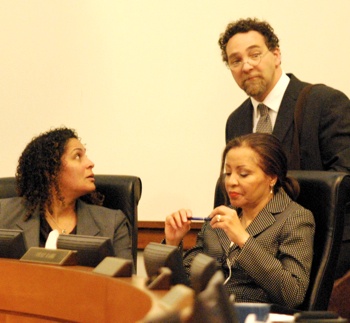
Seated from left: Commissioner Felicia Brabec (D-District 4), who serves as chair of the board’s ways & means committee, and county administrator Verna McDaniel. Standing is Conan Smith (D-District 9).
Alluding to his own experience in business, Smith noted that employees are asked to do more, but also the company cuts back on products or has longer release cycles and fewer features on the products that are released. At the county, however, “we don’t seem to be too keen on doing less.” He pointed out that even at that night’s meeting, the board would be voting on a new program – creating a dental clinic. So he was not in favor of this staff position.
Ronnie Peterson (D-District 6) told commissioners that he appreciated the discussion, but “I take it that there’s not a vote tonight.” [Until this point, no one had publicly mentioned the intent to postpone this item.] He asked what the timeframe was for this work, and what the goals were for the individual that they’d be hiring. He also wanted to know what the expectations were for this person to collaborate, either internally within the county government, or with people in the community.
Peterson also cautioned that the board needs to be clear about who’s leading the organization. He wanted to make sure the position had a different title than “strategic program manager” – the title that was originally proposed. He suggested making the title “special assistant to the administrator for board support.” He said he didn’t want anyone to walk around with a cape thinking that they had more power than the county administrator.
Peterson supported the points made by Sizemore and Dan Smith. “The piggy bank was closed,” he said. If it’s been re-opened, he added, he wished someone would tell him, because he had a wish list of things he’d like to fund.
Kent Martinez-Kratz (D-District 1) agreed with Peterson, saying they had finalized the 2014-2017 budget in November of 2013, but since then several additional items have come to the board for approval that impact the budget. He hated to see a $50,000 or $100,000 request coming to the board every month. Martinez-Kratz said he felt it was the job of all commissioners to listen to constituents and gauge community impacts, and to orient their votes on the budget priorities based on that. He didn’t feel another employee was required for that.
Yousef Rabhi (D-District 8) addressed the references to a piggy bank, saying that the point of this new job is to help the county make investments more strategically. “This is spending a small amount to make sure we’re being more deliberate about the decisions we’re making,” he said. Rabhi also pointed out that this proposal had been part of the budget document that the full board had approved in November of 2013. The job is a contract position, he noted.
Rabhi voiced support for county administrator Verna McDaniel, saying that the board has asked more of her than previous boards have requested of previous administrators. They’re asking more of the administration, he said, while they’ve also taken away resources to do the work.
However, Rabhi felt it was appropriate to postpone action on the proposal, to address some of the issues that Peterson had raised.
Staffing for Budget Work: Board Discussion – Postponement
Rabhi made a motion to postpone until the March 5 meeting.
Dan Smith then said he’d like to postpone it until May 7 – after the board receives a first-quarter budget update from the administration. At that point, the board would have a better picture of the county’s finances. He moved to amend Rabhi’s original motion.
Conan Smith noted that the board had voted on this issue in November of 2013, when they approved the budget. The intent was to have this new position work with the new budget process, he said, and he didn’t want to wait until May to approve it. If they waited, it meant they wouldn’t issue a request for proposals (RFP) until June, and the position likely wouldn’t be filled until halfway through the fiscal year, at best. He was anxious to move the proposal forward as quickly as possible.
Outcome on amending the March 5 postponement to May 7: The motion failed, with support only from Dan Smith, Rolland Sizemore Jr., and Kent Martinez-Kratz.
There was no further discussion.
Outcome on postponing to March 5: The motion passed unanimously.
After the vote, Sizemore again expressed frustration about the proposal. He wondered why the county didn’t take advantage of resources from local universities. He also asked what would happen to the report that would be completed as part of this process – would it be “put on the shelf with the 10 other reports we’ve already got on the shelf?” He noted that the city of Ann Arbor has cut its staff “and they seem to be existing pretty well.”
Sizemore also mentioned the bond proposal that the administration had floated in 2013, to cover pension and retiree health care obligations. At that time, the administrator indicated that the county needed to issue bonds for $350 million, he noted, but “now we seem to have pots of money to spend on things that come up,” like this new position. He hoped McDaniel would come back to the board with more details about the cost. He wondered who would actually hire the person – McDaniel, or the board? He hoped the person would be a resident of Washtenaw County, adding that he hated spending county tax dollars on employees who don’t live here. “I have a lot of questions, and right now I’m pretty upset about this,” Sizemore concluded.
Dental Clinic
A proposal to create a dental clinic for low-income residents of Washtenaw County was on the Feb. 5 agenda for initial approval.
The project is estimated to cost $1.5 million, using funds from the public health Medicaid liability account ($814,786), the public health fund balance ($663,015) and Washtenaw Health Plan ($50,000). According to the county’s public health staff, 58,000 county residents either don’t have dental insurance or on Medicaid dental insurance. However, only a few private dentists accept Medicaid. When up and running, the dental clinic is expected to serve 6,000 patients annually, including residents with income at up to 200% of the poverty level.
It’s expected that federal matching funds would supplement Medicaid reimbursement rates to provide a sustainable long-term cash flow, according to a staff memo. [.pdf of staff memo]
The resolution authorizes contract negotiations with the nonprofit Michigan Community Dental Clinics Inc. to run the clinic and with St. Joseph Mercy Health System, which would contribute space at its Haab Building in Ypsilanti at little to no cost.
The board had been briefed previously on this proposal at two working sessions over the past year.
Discussion on Feb. 5 was brief. Ronnie Peterson (D-District 6) praised the public health staff for their work, saying it was appropriate for them to identify the need and take on the responsibility. It was especially important to provide dental care for children, he said. Several other commissioners also expressed support.
Ellen Rabinowitz, interim health officer and executive director of the Washtenaw Health Plan, noted that outreach will be needed to promote the new clinic. A press release is being drafted, she said, but they’ll wait to release it until after the board takes a final vote on the project at its Feb. 19 meeting.
Outcome: Initial approval for the dental clinic was given on a 7-1 vote, with dissent from Dan Smith (R-District 2). Alicia Ping (R-District 3) was absent. A final vote is expected on Feb. 19.
Dog Licensing
A new ordinance that allows the county to issue municipal civil infractions for owning an unlicensed dog was on the agenda for final approval.
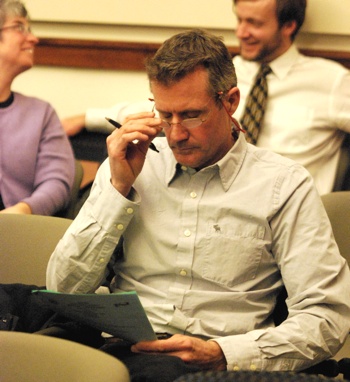
Larry Murphy attended the Feb. 5 meeting of the county board. He has created a campaign committee to run for county commissioner in District 1. He is a Republican. The seat is currently held by Democrat Kent Martinez-Kratz.
The resolution also establishes that the county treasurer’s office would be the bureau for administering these infractions. It also sets new licensing fees. [.pdf of dog license ordinance]
More than a year ago, at the county board’s Nov. 7, 2012 meeting, commissioners approved a civil infractions ordinance that gave the county more flexibility to designate violations of other county ordinances as a civil infraction, rather than a criminal misdemeanor. For example, enforcement of the county’s dog licensing ordinance is low because the current penalty – a criminal misdemeanor of 90 days in jail or a $500 fine – is relatively harsh. The idea is that enforcement would improve if a lesser civil infraction could be used. The new civil infraction fines would be $50 for a first offense, $100 for a second offense, and $500 for a third or any subsequent offense.
An increase in the enforcement is expected to result in an increase in the number of dog licenses, which would provide additional revenue to be used for animal control services.
A draft resolution and staff memo had been prepared in November 2013 but the item was not brought forward to the board for a vote last year. The current proposal is similar to that initial draft. [.pdf of 2014 resolution and memo]
The county treasurer’s office also is proposing to lower the current dog licensing fee from $12 to $6 per year for spayed or neutered dogs and from $24 to $12 per year for dogs that aren’t spayed or neutered. There would continue to be a discount for a three-year license. There would be no charge to license service dogs, with proper documentation and proof of rabies vaccination. More information about current dog licenses is available on the county website.
Deliberations at the Jan. 22, 2014 meeting – when commissioners gave initial approval to this ordinance – included the importance of outreach to educate residents about the changes.
There was no discussion of this item on Feb. 5.
Outcome: Final approval to the dog licensing ordinance passed unanimously.
The ordinance could take effect 50 days after final approval, in late March. But the county treasurer’s office – which is responsible for administering the dog licenses – expects to implement the changes in June or July, following an educational outreach effort.
PACE Program
A resolution to create a new countywide program to help finance energy-efficiency projects for commercial properties was on the Feb. 5 agenda for final approval. Initial approval had been given at the board’s Jan. 22, 2014 meeting, which included public commentary from supporters of the initiative. [.pdf of PACE program documentation] [.pdf of PACE cover memo] [.pdf PACE resolution]
The countywide Property Assessed Clean Energy (PACE) program aims to help owners of commercial (not residential) properties pay for energy improvements by securing financing from commercial lenders and repaying the loan through voluntary special assessments.
The county is joining the Lean & Green Michigan coalition and contracting with Levin Energy Partners to manage the PACE program. Andy Levin, who’s spearheading the PACE program statewide through Lean & Green, had spoken briefly to the board on Jan. 22, 2014, and had previously answered questions about the program at the board’s Dec. 4, 2013 meeting. State Sen. Rebekah Warren also spoke briefly during public commentary on Dec. 4 to support the initiative. She was instrumental in passing the state enabling legislation to allow such programs in Michigan.
The law firm of Miller, Canfield, Paddock & Stone will act as legal counsel. Several other counties are part of Lean & Green, according to the group’s website. Other partners listed on the site include the Southeast Michigan Regional Energy Office, which was co-founded by county commissioner Conan Smith. Smith is married to Warren.
The county’s PACE program differs from the one set up by the city of Ann Arbor, which created a loan loss pool to reduce interest rates for participating property owners by covering a portion of delinquent or defaulted payments. Washtenaw County does not plan to set up its own loan loss reserve.
Discussion was minimal on Feb. 5. Yousef Rabhi (D-District 8) thanked Conan Smith (D-District 9) for his work on this initiative. Smith said he’s been talking with Levin about implementing the program, noting that bad weather had prevented Levin from attending the meeting that night.
Outcome: Final approval for the PACE program was given unanimously.
Road Repair Funding
Commissioners considered a resolution urging Michigan Gov. Rick Snyder to allocate the state’s estimated $1 billion budget surplus to road repair.
At the board’s Jan. 22, 2014 meeting, Alicia Ping (R-District 3) had indicated the likelihood of this resolution coming to the board. She reported that a subcommittee that’s exploring the future of the Washtenaw County road commission had met prior to the county board meeting on Jan. 22. The subcommittee, which Ping chairs, had voted to ask the county board to pass a resolution urging Gov. Rick Snyder to allocate the state’s budget surplus for road repair, distributed to local entities using the current state formula for road allocations.
The resolution’s one resolved clause initially stated:
NOW THEREFORE BE IT RESOLVED, such funds from state surplus should be used for roadway maintenance using the fair formula allocation as prescribed by Public Act 51 of 1951 ensure Washtenaw County benefits fairly from surplus use.
Ping did not attend the Feb. 5 meeting. Andy LaBarre (D-District 7) reported that Ping told him she’d be amenable to changing the resolved clause to reflect that the surplus doesn’t need to be spent entirely on roads, but should include roads. Yousef Rabhi (D-District 8) said he’d support the change, noting that there are other priorities that the surplus could be spent on, including state revenue-sharing with local governments.
The resolved clause was then unanimously amended to insert “in part”:
NOW THEREFORE BE IT RESOLVED, such funds from state surplus should be used in part for roadway maintenance using the fair formula allocation as prescribed by Public Act 51 of 1951 to ensure Washtenaw County benefits fairly from surplus use. [.pdf of resolution]
The phrase “in part” was also inserted into the title of the resolution.
The resolution states that the Washtenaw County road commission maintains about 1,654 miles of roads, including 770 miles of gravel roads. It also is responsible for 111 bridges and more than 2,000 culverts, and is contracted by the Michigan Dept. of Transportation to maintain about 580 lane miles of state trunkline roads. Road commissioners have indicated that there are several million dollars worth of needed repairs that are unfunded.
In a statement issued earlier in the day on Feb. 5, Snyder released some details for a fiscal 2015 budget proposal, including $254 million “to match federal aid and maintain Michigan’s roads and bridges, transit services and aeronautics projects across the state.”
Outcome: The resolution passed unanimously.
Communications & Commentary
During the meeting there were multiple opportunities for communications from the administration and commissioners, as well as public commentary. In addition to issues reported earlier in this article, here are some other highlights.
Communications & Commentary: Services for the Homeless
Yousef Rabhi (D-District 8) said he wanted to follow-up on the discussion that the board had with members of the homeless community at the board’s Jan. 22, 2014 meeting. He had subsequently met with representatives from that group, along with county administrator Verna McDaniel, Mary Jo Callan, director of the county’s office of community& economic development, and Ellen Schulmeister, executive director of the Shelter Association of Washtenaw County. He noted that in order to address the list of demands for increased services at the Delonis Center shelter, which had been presented to the board on Jan. 22, the county needs to partner with other entities in the community.
The board received a more detailed update on this situation at its Feb. 6 working session. That session will be covered in a separate Chronicle report.
Communications & Commentary: Deportation
Rabhi also mentioned the possible deportation of Jose Luis Sanchez-Ronquillo. He noted that a few years ago, the county board had heard from advocates lobbying against another deportation threat – of Ann Arbor resident Lourdes Salazar Bautista. [Bautista and her supporters had attended the board's Dec. 7, 2011 meeting.] In a similar case, Rabhi said, Sanchez-Ronquillo and his wife have lived in Ann Arbor for about 16 years, and their children attend Bach Elementary School. Rabhi reported that he had attended a rally in support of Sanchez-Ronquillo, where it was announced that he’d been granted a one-year extension to stay in the country. While that’s good news, Rabhi noted that “this isn’t the first time it’s happened, and it won’t be the last.” It’s important to think about how to make this a welcoming and diverse community, he said.
Communications & Commentary: Autism Coverage
Diane Heidt, the county’s human resources and labor relations director, gave an update on a proposal that the county administration plans to make formally to the board at a future meeting: To begin offering health care coverage to county employees for the treatment of autism.
She noted that offering the coverage would result in an estimated $182,000 increase in the county’s annual health care premium. Because the county self-funds health care coverage for its employees, that amount will fluctuate based on actual claims, she said.
The main unknown is whether the state will continue to offer reimbursement for autism coverage, Heidt said. There’s been no indication that the state plans to set aside additional funds for fiscal 2014 or beyond. About $26 million that was set aside by the state in previous years could still be tapped for reimbursement. She said she’d continue to gather information and resources, and would meet with the board committee that had been established on Jan. 22, 2014 with commissioners Andy LaBarre, Felicia Brabec and Ronnie Peterson. She anticipated coming to the board with a recommendation on March 5.
Present: Felicia Brabec, Andy LaBarre, Kent Martinez-Kratz, Ronnie Peterson, Yousef Rabhi, Rolland Sizemore Jr., Conan Smith, Dan Smith.
Absent: Alicia Ping.
Next regular board meeting: Wednesday, Feb. 19, 2014 at 6:30 p.m. at the county administration building, 220 N. Main St. in Ann Arbor. The ways & means committee meets first, followed immediately by the regular board meeting. [Check Chronicle event listings to confirm date.] (Though the agenda states that the regular board meeting begins at 6:45 p.m., it usually starts much later – times vary depending on what’s on the agenda.) Public commentary is held at the beginning of each meeting, and no advance sign-up is required.
The Chronicle could not survive without regular voluntary subscriptions to support our coverage of public bodies like the Washtenaw County board of commissioners. Click this link for details: Subscribe to The Chronicle. And if you’re already supporting us, please encourage your friends, neighbors and colleagues to help support The Chronicle, too!





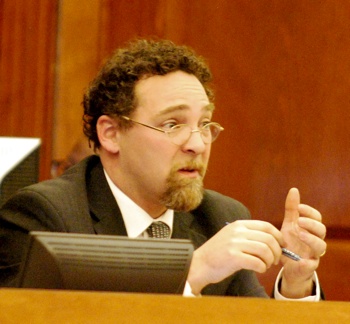
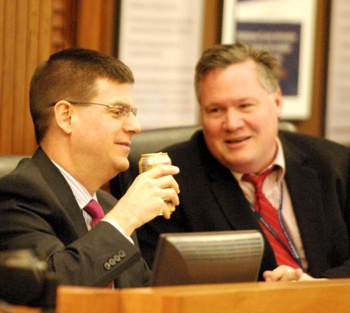
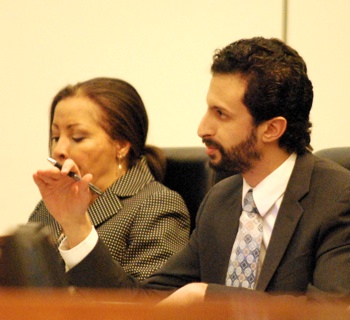
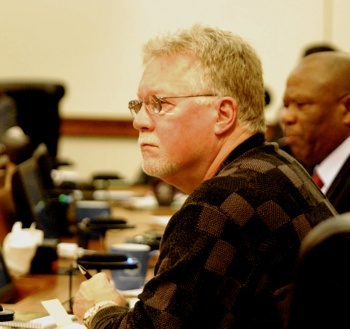
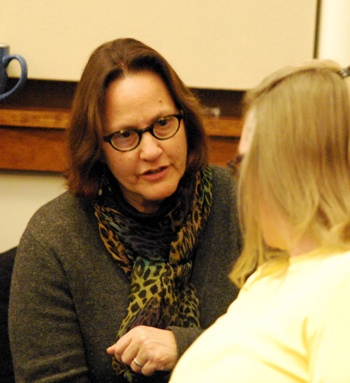
Congratulations to the BOC for its process and result regarding the Platt Road property. Yousef Rabhi has been a leader in this from his very early days on the BOC and Andy LaBarre has also been a positive force. I was particularly glad to see Jeannine Palms on the committee (her community and environmental leadership is an asset that belonged here).
I’m curious about the outcome for the $3 million HUD Sustainable Community grant that you reference. This is the same grant that has paid in part for the ReImagine Washtenaw project. It envisioned affordable housing along the Washtenaw corridor (which the Platt Road location nearly fits) that was also energy-efficient. It was evidently intended for the west Jackson Road area. From the grant application:
The City of Ann Arbor committed parks funds to this project, from both the acquisition and maintenance millages. It was just about the only cash matching funds provided by any of the participating municipality. But evidently the parks acquisition along Jackson did not materialize.
Questions: will this matching fund commitment from the City of Ann Arbor be necessary to use the HUD funds for the Platt Road project? Will the Platt Road project fulfill the promises made in the grant application? Will Council and PAC be involved in any designation of parks funds to that location?
Very interested in hearing more about the concept of affordable housing in that section of Platt Road. Last week I attended a meeting led by the A2 Housing Commission where there was a lengthy discussion re greatly increasing the number of public housing spaces in the 3451- 3457 area of Platt. When many of us in attendance at that meeting expressed concerns about those plans the director mentioned how few other places there were to consider in Ann Arbor. The site near County Farm seems a far better location for the badly needed housing. Glad to hear that so many good people are looking into adding housing there. I look forward to hearing more details about how the space could be developed so that it does not warehouse low income people and adds to the neighborhood.